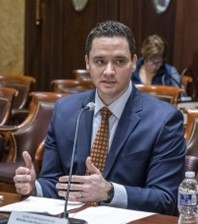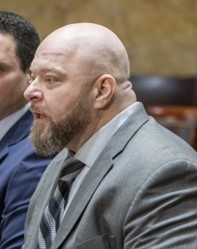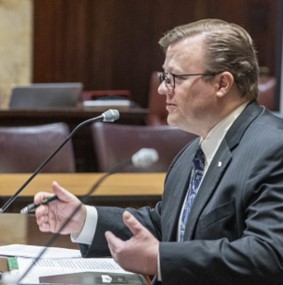March 22, 2023 Policy Hearing Takeaways
March 22, 2023:
Obstacles to Opportunity: PA’s Permitting Process
The Pennsylvania House Republican Policy Committee investigated the obstacles to opportunity faced by Pennsylvania’s people and businesses when navigating the state’s permitting process. The March 22 hearing, hosted by Chairman Kail, included testimony from our industries, manufacturers, and trades that all-too-often are hindered by overzealous bureaucracy and extended wait times. Real-world examples of the losses PA has incurred were shared, along with suggested actions and policies for the state to pursue.
The testifiers that joined the Policy Committee were as follows:
Kevin Sunday - Director of Government Affairs, Pennsylvania Chamber of Business and Industry
Michael Ford - Secretary-Treasurer, Pennsylvania State Building and Construction Trades Council
David Taylor - President & CEO, Pennsylvania Manufacturers’ Association
| Agenda - Bios - Testimony |
Kevin Sunday, director of government affairs for the Pennsylvania Chamber of Business and Industry (PA Chamber), testified from the perspective of the Chamber’s nearly 10,000 members. These members constitute the largest broad-based advocacy organization in the Commonwealth and provide family-sustaining careers and opportunity throughout the State. The businesses and industry within the PA Chamber rely on state agencies to provide the permits and guidance necessary to bring prosperity and inspire growth within the state, but frequently encounter issues with the process.
It is no secret that Pennsylvania’s permitting process is lacking and is far from competitive with other states. Mr. Sunday shared that other states have bragged about their permitting superiority as compared to Pennsylvania, with Governor Hutchinson of Arkansas announcing that an entrepreneur could start building in Arkansas before they could even get a permit in Pennsylvania. This need not be the case, as PA excels in meeting the many other needs of our businesses and manufacturers. The PA Chamber recognizes that the Commonwealth has tremendous potential with early-stage research and development, but uncompetitive permitting policies have resulted in the state losing out on long-term projects and significant manufacturing gains. In short, Pennsylvania has everything it needs to become a business, manufacturing, and energy powerhouse… except for a workable and predictable permitting process.
Mr. Sunday, on behalf of the PA Chamber, offered the following reforms:
| • | Third-Party Review of Permit: Enable state agencies to contract with qualified third-parties to assist with the technical review of permits. | |
| • | Codification of the Governor’s “One Stop Shop”: An executive order to streamline permits for key projects is promising, but should be codified into statute to provide long-term durability to the proposal. | |
| • | Streamlining of Permit Appeals: The scope of permit challenges should be limited to the issues raised during public comment, as is the standard with federal permits. | |
| • | Stop Draining Agency Resources: Legal fees incurred through permit appeals should not limit the ability of our state agencies to confidently do their jobs. Awarding of legal fees should only occur in instances where entities acted in bad faith, and should not be a means for activist groups to use to fund their efforts. | |
| • | “Shot Clocks” & “Deemed Approved”: A set timeframe for permit review and issuance must be set, and abided by. If our state agencies do not comply with the timeline defined in statute the permit should be “deemed approved”. |
 |
| WATCH |
| “We want to make the state more competitive, and fixing the permitting process is key to do that.” Kevin Sunday Director of Government Affairs, Pennsylvania Chamber of Business and Industry |
Michael Ford, Secretary-Treasurer of the Pennsylvania Building and Construction Trades Council, brought the perspective of our ready-and-able workforce to the attention of the Committee. Long permit wait-times, uncertainty within the process, and excessive regulation impede the opportunities available to the tradesmen who are hungry for work throughout the state. When a new road, pipeline, or manufacturing facility gets delayed or cancelled due to excessive permit timelines or never-ending objections the loss is felt by both the permit applicant AND all of the men and women that planned to devote the hours and labor to the project. This loss to the Commonwealth and our workforce is nearly impossible to quantify, but Mr. Ford noted that a single project lost to permitting issues, such as a 7-mile pipeline needed for a US Steel facility, can result in thousands of lost man hours, the cancelation of larger projects, and discourages our existing workforce from remaining in PA.
Mr. Ford, along with the trades workers he represents, knows that the status quo for permitting in PA is only slow and costly when state agencies choose for it to be. The average bridge or road often requires four to eight YEARS to permit. But, when the Fern Hollow Bridge collapsed in Pittsburgh the permits required for repairs were completed in only eight months, showing agencies can act quickly when needed. By swiftly granting a permit state agencies can reduce the toll of inflation on our builders and trades workers while simultaneously enabling more work to be done throughout the state. Our labor force does not have the luxury to wait until a permit is granted to receive a paycheck, and they want to get to work as soon as possible to better their communities.
 |
| WATCH |
| “We miss out on a lot of projects in Pennsylvania because it just takes too long to do anything!” Michael Ford Secretary-Treasurer, Pennsylvania State Building and Construction Trades Council |
David Taylor, President and CEO of the Manufacturers’ Association, joined the Committee to share legislative and agency policy proposals that can rectify the state’s permitting woes. Proposals and executive orders stemming from Governor Shapiro’s office are promising, but do not go far enough and should be enshrined in law. The fixes proposed by Mr. Taylor are largely common sense, can be achieved through policy or legislative changes, and should be able to cross the partisan divide. The proposals Mr. Taylor provided are as follows:
| • | When applications are not reviewed within the legal time limit they should be automatically “deemed approved” and issued to the applicant. | |
| • | State agencies should be required to dedicate permit fees to permit processing until there is no permit backlog and all permits are processed by the legal deadlines. | |
| • | Without a Pennsylvania-specific reason no state regulations should be stricter than federal regulations. | |
| • | Regulations should be reviewed on an ongoing basis, and removed when found to be unnecessary. | |
| • | The costliest regulations should require legislative approval before enaction. Similar to the REINS Act proposed within the federal government. |
 |
| WATCH |
| “The customer-focused view of government functions is a welcome change, and we thank [Governor Shapiro] for it, although it does not get quite as far as we need to go.” David Taylor President & CEO, Pennsylvania Manufacturers’ Association |
All testifiers agreed with these proposals, and they have been presented and supported by our trades, manufacturers, and industries for many years now. The executive branch may have ideas of their own, but the entities applying for and complying with our existing permitting process are in agreement that their reforms are the path towards prosperity the Commonwealth should pursue. Legislative proposals exist as co-sponsorships or bills for each of the individual ideas shared by the testifiers, and will be pursued throughout the 2023-24 session.
Surprisingly, over the course of the hearing it was found that Pennsylvania has no state-wide compilation of pad-ready or brownfield sites. Brownfields, which is a term used for an aged industrial site unsuitable for most development, are ideal locations for new manufacturing and business that can utilize the shells of former industry. The Commonwealth offers tax incentives to utilize these locations, and it greatly benefits the old mill towns and industrial centers throughout the state, but entrepreneurs and investors cannot access any comprehensive list of these locations. This issue is tertiary to our failed permitting process, but important to the environmental, zoning, and industrial concerns of the state. The state’s inability to compile this information for the benefit of our environment and industries is but another reform brought to light by the day’s testimony.
The House Republican Policy Committee hearing on March 22, 2023, shed light on various challenges and potential solutions related to Pennsylvania's permitting process. The testimonies provided valuable insights that will help streamline the permitting process, foster economic growth, and create more opportunities for the people and industries of Pennsylvania. The failures of the status quo are obvious, and the need for change has never been more dire. The Commonwealth has every resource necessary to become an economic powerhouse, if only our permitting process were reformed to meet the needs of the state and the regulated community. Chairman Kail and the Policy Committee extend their gratitude to the testifiers for their invaluable contributions to this important discussion, their work advancing the capabilities and possibilities of the state, and the legislative and policy proposals shared which will propel Pennsylvania into the future.